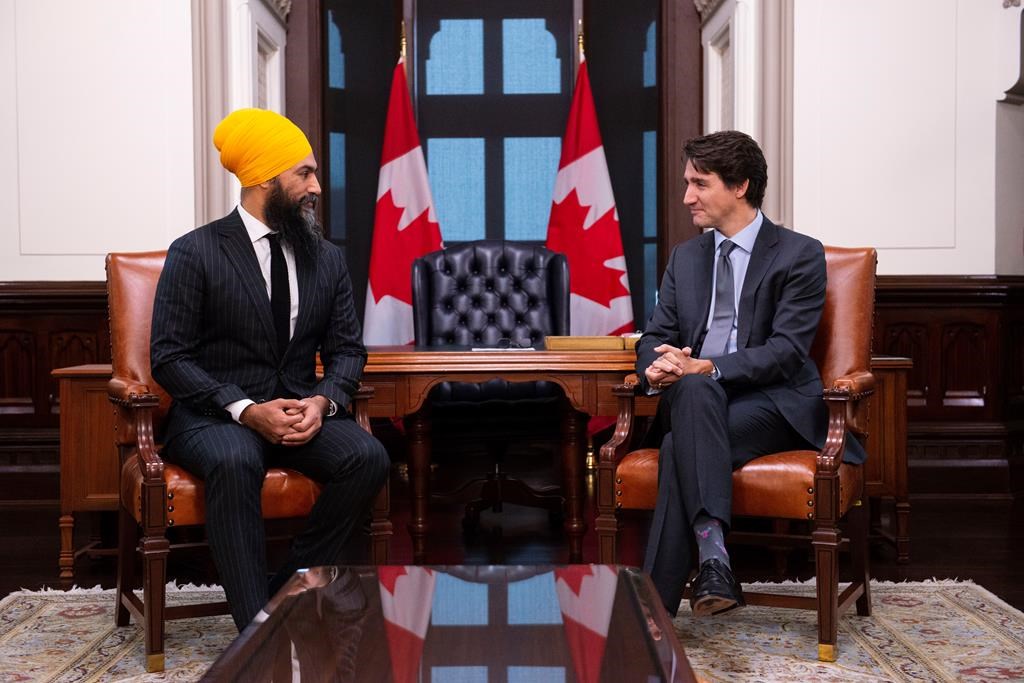Justin Trudeau has been Canada’s 23rd Prime Minister since 2015. Contrary to popular belief that’s been widely propagated by Liberal supporters and spin doctors, he’s accomplished almost nothing in office.
Until Monday evening, that is. Trudeau earned an unusual political distinction that no other Canadian PM has ever achieved. He found a way to shift the most left-leaning government in our country’s history even further to the left.
How did he do this? By signing a three-year agreement with Jagmeet Singh and the NDP.
Delivering for Canadians Now, A Supply and Confidence Agreement details the working arrangement between the two parties that will run from March 22, 2022 until Parliament rises in June 2025. It’s not an official coalition, which means no New Democrat will have a seat at the cabinet table. Rather, the NDP “agrees to support the government on confidence and budgetary matters – notably on budgetary policy, budget implementation bills, estimates and supply” and the Liberals commit “to govern for the duration of the agreement.” Moreover, the NDP has agreed to “not move a vote of non-confidence, nor vote for a non-confidence motion during the term of the arrangement.”
As the agreement states in part, “The parties have identified key policy areas where there is a desire for a similar medium-term outcome. We have agreed to work together during the course of this Parliament to put the needs of Canadians first.”
Some of these key policy areas include: introducing a dental care plan for low-income Canadians, passing the Canada Pharmacare Act in late 2023, new affordable housing measures, initiating massive emissions reductions by 2030, introducing Just Transition legislation to help workers, unions and other communities, ensuring ten days of paid sick leave is in place this year, additional investments for Indigenous housing, a fairer tax system, and removing barriers to voting and participation.
Dental care and Pharmacare, which are part of the current NDP playbook, have been rooted in socialist thinking for decades. They’ve been previously rejected by most Canadian voters, and not just right-leaning ones, due to the enormous costs and inefficiencies these state-run plans will undoubtedly incur. With the Liberal-NDP agreement in place, a proper debate in Parliament won’t happen and these policies will easily pass in a minority Parliament operating like a majority government is in charge.
Canada will also witness massive increases to the size of government, rate of taxation and role of the nanny-state. Any hope for a return to small government, low taxes and more individual rights and freedoms by voting out the minority Liberals has fizzled out in one fell swoop. If you thought things were bad under Trudeau for nearly seven years – and it’s been bloody awful – you ain’t seen nothing yet.
The Liberals and NDP are both declaring victory with the signing of this agreement. That’s predictable, but here’s the thing. Only one of them has the right to do so, and it’s not the junior partner in this arrangement.
Singh naively believes Canadians will give his party full credit for bringing in programs like public dental care and Pharmacare, if they’re successful. Not a chance. Most people barely remember what they had for breakfast a couple of days ago, let alone the specific party that proposed certain policies. If these social programs (and others) achieve what Trudeau hopes they’ll ultimately achieve, he’ll take all the credit – and the voters will reward his Liberals for introducing these policies.
Here’s a historical example to prove my point.
The Canadian Broadcasting Corporation exists in Canada due to the efforts of Prime Minister R.B. Bennett and the Progressive Conservatives. They launched the state-owned Canadian Radio Broadcasting Commission, the CBC’s predecessor, in 1932. Without it, our public broadcaster may never have come to fruition – or could have ended up looking very different than it does today.
How many Canadians know this? Other than a smattering of historians and political junkies, the numbers are relatively small. Most Canadians would likely (and incorrectly) assume the Liberals and NDP had something to do with it, since they vigorously defend the CBC. Today’s Conservatives largely believe in either reducing funding for the public broadcaster, or defunding them altogether. So, their historical role has either been forgotten, ignored or usurped by parties that had nothing to do with the CBC’s creation.
That’s what will happen to Singh and the NDP.
Without any representation at the cabinet table, the NDP’s initiatives will be lost in the political wilderness. Singh’s memorable opposition to Trudeau’s three instances of blackface will become a tiny footnote in history. His party has seemingly accepted the fact that they’re irrelevant, can’t win federal elections on their own, and are more undeserving of representation in the House of Commons than ever before.
The NDP will be remembered for a couple of things. Protecting Trudeau, a weak, ineffective Prime Minister who has repeatedly embarrassed his country on the domestic and international stage. Propping up a Liberal Party that’s won the last two federal elections with minority governments and finished second in the popular vote both times, and giving them a safe political ride for the next three years.
Oh, and signing on to a misguided agreement that is, in the words of interim Conservative leader Candice Bergen, “little more than backdoor socialism.” Singh and Trudeau are probably both fine with this, truth be told.
Michael Taube, a long-time newspaper columnist and political commentator, was a speechwriter for former Canadian prime minister Stephen Harper.






